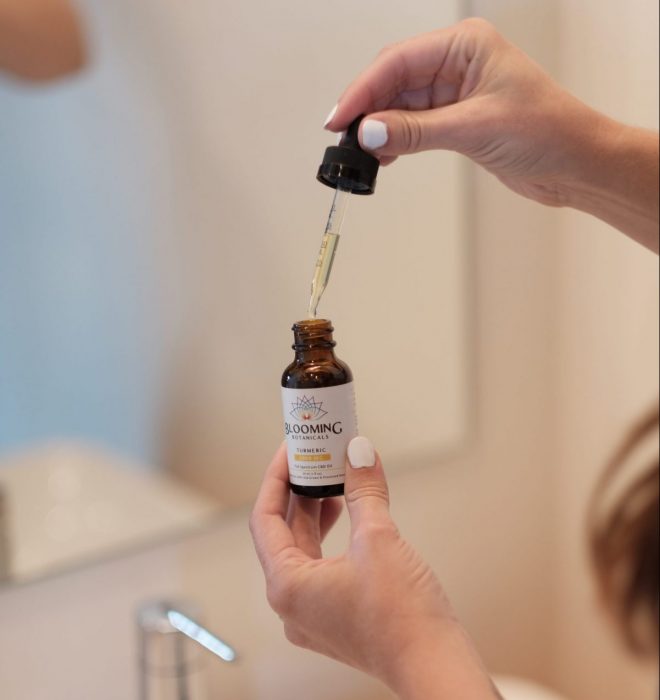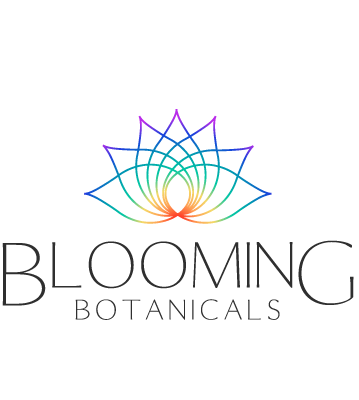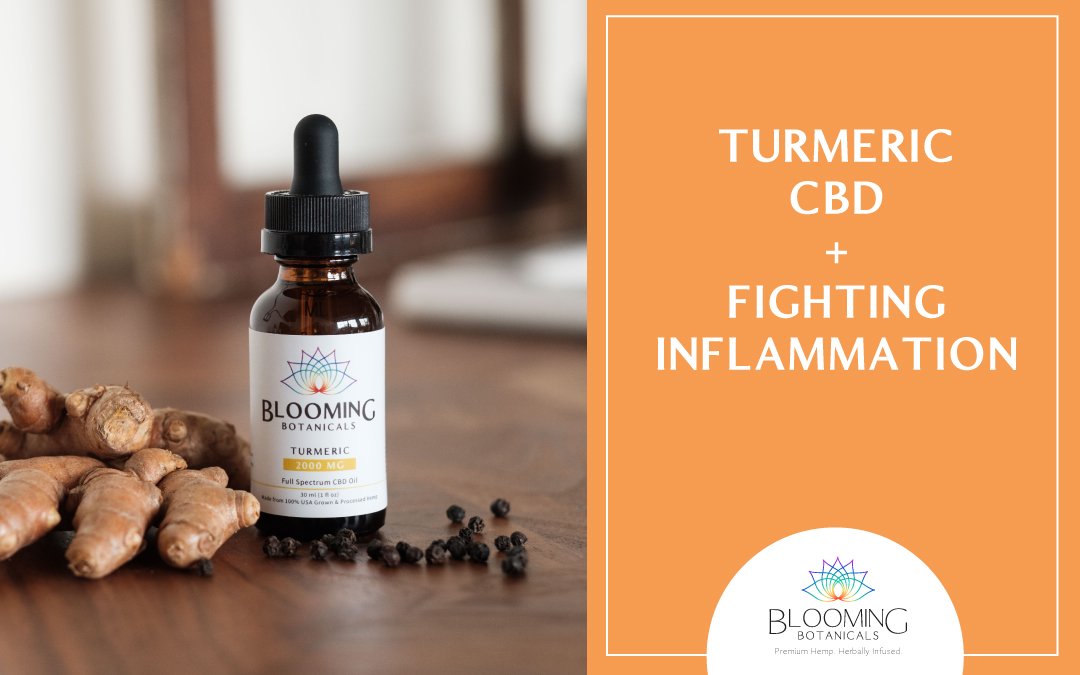Learn why turmeric CBD is gaining popularity and becoming a favored product for reducing inflammation in the body.
If you’re new to both CBD and turmeric, one thing to know is that they are all natural remedies and have been used medicinally throughout human history! Currently, they are becoming preferred alternatives, or complimentary treatments, to pharmaceuticals for fighting inflammation due to their lack of negative side effects.
In this post, you will learn what exactly inflammation means, the benefits of turmeric, why CBD might be good for inflammation, and how turmeric CBD may help with reducing your inflammation, as well as any potential side effects.

What Is Inflammation?
Inflammation is a necessary process in the body. Inflammation occurs when the immune system responds to any infections and/or injuries that have plagued your body.
When you have a wound, you run the risk of infection. The body’s immune system responds by releasing antibodies, blood, white blood cells, and protein to the damaged area. It is necessary for repairing and protecting the body from deadly pathogens and bacteria. This flurry of activity results in inflammation or swelling. It is a necessary part of the healing and repair process.
There are 2 types of inflammation you should know about. They include:
Acute inflammation that lasts for a shorter period. Acute inflammation is the body’s normal inflammatory response. There can usually be swelling, pain, and redness.
Chronic inflammation is persistent and includes long-term inflammation. This type of inflammation has been linked with causing various ailments like cancer, heart disease, and even arthritis.
Evidently, inflammation can be both good and bad for your health and wellbeing. Inflammation is required for repairing damaged tissue and cells, like when working out. But once it becomes chronic, your health as a whole is at risk since you are becoming more vulnerable to conditions like Alzheimer’s disease.
Chronic inflammation is what you want to avoid if possible. If you experience obesity, smoke, or have a poor diet, you may be at a higher risk of experiencing chronic inflammation.
What Is Turmeric?
Turmeric is an herbal plant that has been used throughout human history to flavor food and use for medicinal purposes. It is grown mainly in India, Southeast Asia, and Central America.
Turmeric is also referred to as the Golden Spice. To get this spice, the roots of the turmeric plant are usually dried and ground into powder. The result is a bright yellow powder that is characteristic of turmeric.
The roots of this plant are the most important because they contain all the beneficial components of turmeric. Turmeric has 100 different elements and the most popular is curcumin. Curcumin is responsible for most of turmeric’s health benefits and its characteristic yellow color.
Some health benefits of curcumin are its natural anti-inflammatory and antioxidant properties.
Turmeric has been used in India’s traditional health practice (Ayurveda medicine) that utilizes natural resources and treatment. It’s also popular in the Japanese island of Okinawa, where residents often consume turmeric drinks and tea. Okinawa is considered a “Blue Zone” which are regions of the world where a higher than usual number of people live much longer than average.
Turmeric alone is a great natural remedy that offers health benefits that may help fight your inflammation and improve your general wellbeing. That being said, in order for our bodies to process and make use of curcumin, it must be combined with certain elements, like black pepper, to be absorbed. This is why we have added co2 extracted black pepper to our Turmeric CBD tinctures. Adding the black pepper into our formulations increases the bioavailability of our turmeric by 2000%! Many people are not aware of this fact, and end up wasting turmeric supplements because of the lack of bioavailability.
What Is CBD?
Cannabidiol (CBD) is one of the 100+ compounds found in the cannabis plant. THC (tetrahydrocannabinol) is the most abundant and researched cannabis compound.
The main difference between these two compounds is that CBD is non-psychoactive, so you will not get high by using it. THC is the primary psychoactive compound in cannabis. It is responsible for the high sensation that most people associate with cannabis.
Within the past few years, CBD’s popularity has grown. An estimated 64 million Americans have tried CBD. But is it legal to use CBD products?
In terms of legality, the 2018 Farm Bill declared that CBD is federally legal in all 50 U.S. states. It states that CBD products are legal when derived from hemp plants (not marijuana) and have THC levels of <0.3%.
Marijuana has high quantities of THC and not as much CBD, while hemp has high CBD quantities and reduced or low THC quantities.Therefore to reap the benefits of CBD you must use products derived from the hemp plant, ideally from reputable CBD brands.
How a Turmeric CBD Tincture May Help With Reducing Inflammation
Inflammation has been linked or associated with many fatal diseases like cancer, diabetes, and arthritis. If you have inflammation frequently, you are at a higher risk of contracting or getting such diseases. Finding relief for acute and/or chronic inflammation is a top priority to stay healthy!
CBD and turmeric are some of the best anti-inflammatory natural remedies available. So it is no surprise that various brands are utilizing these two products and compounds to create an alternative anti-inflammatory medicine or remedy.
Will turmeric CBD products help in fighting inflammation and, does the science support it?
How CBD affects inflammation is by interacting with your endocannabinoid system (ECS). The ECS is a biological system involved in many of your bodily functions like sleep and pain. It is in your central nervous system and connects to all your organs.
The ECS has two chief cannabinoid receptors that are the CB1 and CB2 receptors.
The CB1 receptors affect your memory, appetite, mood, and sleep. The CB2 receptors affect your immune system.
Since inflammation is an immune system response, the CB2 receptors interact with CBD. This interaction leads to an anti-inflammatory response.
A research review highlighted that cannabinoids are a new class of anti-inflammatory agents against several inflammatory and autoimmune diseases. Also, the specific targeting of CB2 receptors holds promise for fighting inflammation.
A study on rats with osteoarthritis (OA), which is the most common type of arthritis, was also conducted. Pain and inflammation are some of the signs and symptoms of OA. When the rats took CBD, acute inflammation was reduced. Also, joint pain was reduced. This research indicates CBD may be a safe, useful therapeutic product for OA.
For turmeric, its role in providing relief from inflammation is scientifically proven too. Turmeric and curcumin are popular due to their anti-inflammatory properties.
NSAIDs, Aspirin, Turmeric, and Inflammation
Another study of curcumin’s anti-inflammatory properties evaluated the effects of this compound on spermatic cord edema and tenderness in 46 men (15–68 years old) who had just undergone surgery. After surgery, they received curcumin, placebo, or phenylbutazone (NSAID) three times a day for 6 days.
It was recorded that inflammation decreased by 84.2% in the curcumin group. By 61.8% in the placebo group and by 86% in the phenylbutazone group. Although the values for the curcumin and phenylbutazone groups were similar on day 6, curcumin proved to be superior by reducing all four measures of inflammation.
A study on curcumin (turmeric) plus how it compares to traditional inflammatory drugs, such as aspirin and nonsteroidal anti-inflammatory drugs (NSAIDs) like ibuprofen, was done. The results show that aspirin and ibuprofen are the least potent, while curcumin is the most potent anti-inflammatory agent in the study.
Therefore it is not a surprise that there is a rise in seeking alternative medicine, like turmeric!
NF-κB and Immune Diseases
The nuclear factor-κB (NF-κB) molecule is part of your immune system, but it is also connected in leading to different inflammatory diseases. It is an inflammatory signaling molecule. Thus to curb these diseases, NF-κB should be inhibited/blocked.
A study on melanoma, a type of skin cancer, was conducted. Since cancer is a result of chronic inflammation, curcumin was used. Here curcumin was shown to block NF-kB activity, therefore, inhibiting the growth of melanoma cells. So cells and genes related to inflammation are not activated.
Combining Turmeric & CBD for the ultimate anti-inflammatory
This scientific evidence shows that turmeric (curcumin) can be used to help reduce inflammation. It has also been shown effective in combating inflammatory diseases.
CBD and turmeric are two remedies for inflammation, once you combine them, you have a dynamic duo! A CBD turmeric combination may provide the all the necessary relief you need from inflammation.
Potential Side Effects of Turmeric and CBD compared to NSAIDs
Most over-the-counter drugs for inflammation like NSAIDs have the potential for adverse side effects, like heart failure. But as a first time user of turmeric and CBD, there are much less severe side effects.
Potential side effects for NSAIDs:
- Indigestion
- Stomach ulcers or bleeding
- Headaches
- Allergic reactions
- High blood pressure
- Stomach pain
- Vomiting
While life threatening side effects aren’t the norm, NSAIDs still have potential to cause problems with your liver, kidneys or heart and circulation. In rare cases, NSAIDs can contribute to serious issues such as heart failure, heart attacks, or strokes. NSAIDs are also not intended to safely be taken regularly on an ongoing basis, especially not in high doses.
Potential side effects for turmeric:
- Nausea
- Upset stomach
- Diarrhea
- Dizziness and headaches
Potential side effects for CBD:
- Dry mouth
- Nausea
- Diarrhea
- Fatigue
- Appetite loss
If you are allergic to any one of these compounds, it’s advisable not to utilize turmeric CBD. As with any health supplement, it’s also crucial to consult with your doctor/physician before adding turmeric CBD for inflammation into your healthcare routine.
Conclusion
Turmeric CBD tinctures combine some of nature’s best remedies for inflammation. You will get to experience a product that has been shown to help with reducing inflammation and does not have many, if any, severe adverse side effects.
Since most deadly and infectious diseases have inflammation as a symptom. CBD and turmeric are becoming a sought after alternative. While these two compounds help in alleviating inflammation, it is important to note they are not a magic pill or cure all for chronic inflammatory diseases.

